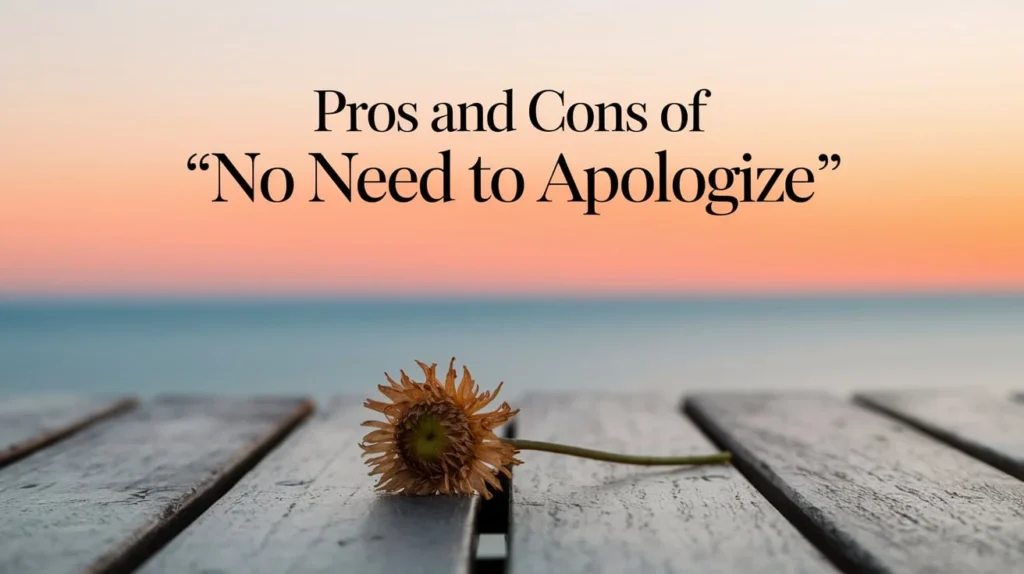We’ve all been there—someone says “Sorry” when they didn’t really do anything wrong, and you feel like you need to reassure them that it’s okay. The phrase “No need to apologize” is commonly used, but sometimes you want to express the same sentiment in a slightly different, more thoughtful way.
Whether you’re comforting a friend, assuring a colleague, or just trying to be kind, there are many ways to say this that feel personal and meaningful. Let’s dive into 20 alternatives you can use in various situations.
What Does ‘No Need to Apologize’ Mean?
Before we jump into alternatives, let’s make sure we’re on the same page. “No need to apologize” is a phrase often used to let someone know that they haven’t done anything wrong, and there’s no need for them to feel bad or guilty. It’s a way of reassuring the person that everything is fine, and there’s no need for any further explanation or guilt.
This phrase is typically used in casual conversations, often when someone expresses remorse or apologizes unnecessarily. It’s a comforting response to let them know they don’t need to worry.
Is It Professional/Polite to Say “No Need to Apologize”?
Absolutely! Saying “No need to apologize” can be both polite and professional, depending on the context. It’s a gentle, reassuring way to make someone feel more comfortable. However, it’s important to be mindful of the tone and situation.
In professional settings, you might want to be slightly more formal or avoid using it too often, especially if the person is apologizing for something serious. But in everyday conversations or emails, it’s a thoughtful way to keep things light and understanding.
Pros and Cons of Saying “No Need to Apologize”

Pros:
- Reassures the person: It helps the person feel at ease and takes the pressure off them.
- Promotes a relaxed conversation: It creates a more casual, friendly atmosphere.
- Strengthens relationships: Shows empathy and understanding toward the other person.
Cons:
- Could be misunderstood: Sometimes, people might think you’re brushing off their feelings.
- Might seem dismissive: If not said with care, it can sound like you don’t value the person’s emotions.
Synonyms for “No Need to Apologize”
- It’s Completely Fine
- No Big Deal
- Don’t Worry About It
- It Happens!
- No Need for That
- All Good
- You’re Fine!
- Not a Problem at All
- No Worries!
- It’s All Good
- It’s Totally Okay
- No Stress
- That’s Alright
- No Harm Done
- We’re All Good
- Don’t Give It Another Thought
- No Need to Bother
- Everything’s Fine
- You’re All Set
- It’s Nothing to Worry About
1. “It’s Completely Fine”
Sometimes, a simple phrase like “It’s completely fine” can make all the difference in putting someone at ease. It’s soft, nonchalant, and assures them that everything is okay.
Scenario Example:
Subject: It’s Completely Fine
Hi [Name],
Thank you for reaching out. Honestly, it’s completely fine. I understand things got busy, so there’s no need for any apology.
Best,
[Your Name]
Best Use: Perfect for when someone apologizes for something very minor, like being a few minutes late to a meeting.
Additional Note: It’s a gentle way to let someone know they’re being too hard on themselves.
2. “No Big Deal”
Want to keep it casual? Try saying “No big deal.” It’s a friendly, reassuring way of telling someone that their apology is unnecessary.
Scenario Example:
Subject: No Big Deal
Hi [Name],
No big deal at all! I know things can get hectic, and you don’t need to apologize. We’ve got it covered.
Best,
[Your Name]
Best Use: Ideal for informal situations, like when a friend or coworker feels the need to apologize for something small.
Additional Note: This phrase has a very casual tone, so use it with friends or people you know well.
3. “Don’t Worry About It”
Sometimes, a little reassurance is all someone needs. Saying “Don’t worry about it” instantly puts people at ease and takes the pressure off.
Scenario Example:
Subject: Don’t Worry About It!
Hi [Name],
No worries at all! Honestly, don’t worry about it. We’re all good to go, and I totally understand.
Best,
[Your Name]
Best Use: This is great for informal situations where you just want to remind someone that they’ve done nothing wrong.
Additional Note: Be careful with this one in professional settings; it’s often best used with people you know personally.
4. “It Happens!”
We’ve all been there, so a phrase like “It happens!” can be both light-hearted and reassuring. It lets the other person know that what happened is no big deal.
Scenario Example:
Subject: It Happens!
Hi [Name],
It happens! Don’t worry at all—everything is perfectly fine on my end.
Best,
[Your Name]
Best Use: Perfect for moments when someone apologizes for a small mistake. It’s a warm, non-judgmental response.
Additional Note: Use this when you want to bring a little humor into the situation, but be mindful of the tone.
5. “No Need for That”
If someone is overly apologetic, a phrase like “No need for that” can help cut the tension and let them know everything is totally fine.
Scenario Example:
Subject: No Need for That
Hi [Name],
No need for that at all! I totally understand, and there’s no need to apologize. We’ve got everything under control!
Best,
[Your Name]
Best Use: This phrase works well when someone feels they’ve inconvenienced you, but you want to let them know there’s no reason to feel bad.
Additional Note: Best used with coworkers or friends who may tend to apologize for things out of their control.
6. “All Good”
Casual and to the point, “All good” is a quick way to assure someone that you’re not upset or bothered.
Scenario Example:
Subject: All Good!
Hi [Name],
No worries at all, it’s all good! I appreciate your thoughtfulness, but there’s nothing to apologize for.
Best,
[Your Name]
Best Use: Great for quick, easygoing conversations where you want to let someone know everything is fine.
Additional Note: This works best in casual emails with close colleagues or friends.
7. “You’re Fine!”
When someone is feeling overly apologetic, simply saying “You’re fine!” can provide immediate relief and let them know there’s no reason to apologize.
Scenario Example:
Subject: You’re Fine!
Hi [Name],
Don’t worry about a thing—you’re fine! Everything is going great, and there’s no need to apologize.
Best,
[Your Name]
Best Use: Excellent for putting people at ease, especially when they apologize for something minor.
Additional Note: This is a very friendly, informal option—use it with people you have a good rapport with.
8. “Not a Problem at All”
This is a reassuring way to let someone know that their apology is unnecessary and that everything is perfectly okay.
Scenario Example:
Subject: Not a Problem at All
Hi [Name],
Not a problem at all! It’s completely understandable, so there’s no need to apologize. I’m glad we’re on the same page.
Best,
[Your Name]
Best Use: Use this when someone feels like they’ve caused a minor inconvenience.
Additional Note: This phrase conveys a calm and understanding tone.
9. “No Worries!”
Slightly more relaxed than other phrases, “No worries!” is perfect for informal conversations, especially with friends or colleagues you know well.
Scenario Example:
Subject: No Worries!
Hi [Name],
No worries at all! I completely understand, and there’s nothing to apologize for. Everything’s great!
Best,
[Your Name]
Best Use: This is perfect for everyday interactions when someone apologizes for a minor slip-up.
Additional Note: It’s best to use this one with people you have a casual relationship with.
10. “It’s All Good”
If you’re looking for a friendly, laid-back way to reassure someone, “It’s all good” does the job perfectly. It’s short, sweet, and gets straight to the point.
Scenario Example:
Subject: It’s All Good
Hi [Name],
It’s all good, no need to apologize. I totally understand, and everything is going fine on my end.
Best,
[Your Name]
Best Use: A great phrase for informal, friendly emails when someone apologizes for something trivial.
Additional Note: It’s a warm and simple way to let someone know everything is fine.
11. “It’s Totally Okay”
This is a gentle and empathetic way to reassure someone that they haven’t done anything wrong. “It’s totally okay” conveys warmth and understanding, perfect for letting someone off the hook.
Scenario Example:
Subject: It’s Totally Okay
Hi [Name],
It’s totally okay! Don’t even worry about it. Things happen, and we’ve got it covered on this end.
Best,
[Your Name]
Best Use: A great option when someone feels the need to apologize for a minor issue, such as missing a deadline or forgetting a small detail.
Additional Note: Use this phrase when you want to keep the conversation light and easy-going. It’s perfect for informal exchanges.
12. “No Stress”
A bit more laid-back, “No stress” is a great way to show that you aren’t bothered by whatever happened. It has a relaxed, friendly vibe to it.
Scenario Example:
Subject: No Stress!
Hi [Name],
No stress at all! I totally understand, and there’s no need to apologize. We’re good to go.
Best,
[Your Name]
Best Use: Perfect for reassuring someone that their mistake or delay is no big deal.
Additional Note: This works best in casual conversations, especially with people who don’t tend to take things too seriously.
13. “That’s Alright”
This phrase is gentle and calm. “That’s alright” is often used to show that everything is okay, and the person doesn’t need to worry.
Scenario Example:
Subject: That’s Alright!
Hi [Name],
That’s alright! No need to apologize—everything is fine, and we can move forward without a hitch.
Best,
[Your Name]
Best Use: Ideal for situations where someone might feel they’ve inconvenienced you with something minor, like a slight delay or small mistake.
Additional Note: It’s a soft, polite response that lets the person know you’re not upset or bothered.
14. “No Harm Done”
Sometimes, “No harm done” is exactly what you need to say to reassure someone that there are no lasting consequences from their actions. It’s calming and positive.
Scenario Example:
Subject: No Harm Done
Hi [Name],
No harm done! Honestly, everything’s good here. Thanks for taking the time to explain, but there’s no need to apologize.
Best,
[Your Name]
Best Use: Use this when someone apologizes for a small error, and you want to emphasize that it didn’t cause any issues.
Additional Note: It works great in professional settings as well as casual ones, especially when you want to show that things are still on track.
15. “We’re All Good”
This one is light, reassuring, and to the point. Saying “We’re all good” is an easy way to ease any tension and move past an apology.
Scenario Example:
Subject: We’re All Good
Hi [Name],
We’re all good on my end! No need to apologize—things happen, and I completely understand. Let’s just keep going.
Best,
[Your Name]
Best Use: A great phrase to use when you want to reassure someone after they’ve apologized for something small, especially when it’s no big deal.
Additional Note: This is casual and works best in more informal settings or when you know the person well.
16. “Don’t Give It Another Thought”
This phrase gives the impression that the matter is so minor it’s not even worth discussing anymore. “Don’t give it another thought” puts the person’s mind at ease and signals that they can move on.
Scenario Example:
Subject: Don’t Give It Another Thought
Hi [Name],
Don’t give it another thought! There’s no need to apologize—we’ve got it covered, and everything is good to go.
Best,
[Your Name]
Best Use: Ideal for when someone is over-apologizing for something minor and you want them to stop worrying.
Additional Note: This phrase has a reassuring tone that helps keep the conversation light and stress-free.
17. “No Need to Bother”
When you want to let someone know that their apology is unnecessary and that you’re not bothered at all, “No need to bother” is a perfect way to say it.
Scenario Example:
Subject: No Need to Bother
Hi [Name],
No need to bother with an apology at all! I understand, and there’s absolutely no problem. Everything is running smoothly.
Best,
[Your Name]
Best Use: Use this when someone is apologizing for something they shouldn’t even be apologizing for, like missing a minor meeting or sending a late message.
Additional Note: This works well with colleagues or friends who tend to apologize more than necessary.
18. “Everything’s Fine”
Sometimes, the simplest reassurance is the best. “Everything’s fine” is direct, straightforward, and offers a lot of comfort in just two words.
Scenario Example:
Subject: Everything’s Fine
Hi [Name],
Everything’s fine! You don’t need to apologize—things happen, and I completely understand. Let’s move forward.
Best,
[Your Name]
Best Use: This is perfect for casual emails where someone apologizes for a minor inconvenience, and you want to let them know it’s really no issue.
Additional Note: It’s a very calm and neutral way of saying “it’s all okay,” without sounding dismissive.
19. “You’re All Set”
This phrase is great for letting someone know that they don’t have to worry about anything. “You’re all set” shows them that everything is under control and that they don’t need to apologize.
Scenario Example:
Subject: You’re All Set
Hi [Name],
You’re all set on my end! No need for any more apologies. Everything is good to go, and I’m glad we’re moving forward.
Best,
[Your Name]
Best Use: Ideal for reassuring someone who may feel they’ve messed up or caused inconvenience.
Additional Note: This one is particularly helpful in work situations where people want to be on top of everything but may be overly apologetic.
20. “It’s Nothing to Worry About”
Last but not least, “It’s nothing to worry about” is a great way to assure someone that they’ve done nothing wrong, and they have no reason to feel bad.
Scenario Example:
Subject: It’s Nothing to Worry About
Hi [Name],
It’s nothing to worry about at all! Don’t stress it. Everything is fine, and I’m not bothered at all.
Best,
[Your Name]
Best Use: Use this when you want to assure someone who’s clearly concerned about something they may have done, even if it wasn’t an issue at all.
Additional Note: It’s a great phrase for calming down anxious people and showing that there’s no reason for them to feel guilty.
Conclusion
Choosing the right words can make all the difference when someone feels the need to apologize. Instead of saying “No need to apologize” every time, try mixing it up with these 20 thoughtful alternatives. Each phrase has its own tone and context, allowing you to express warmth, understanding, and reassurance in a way that feels personal and genuine.
Whether you’re comforting a friend, reassuring a colleague, or just easing someone’s mind, these alternatives will help you handle any situation with care.















